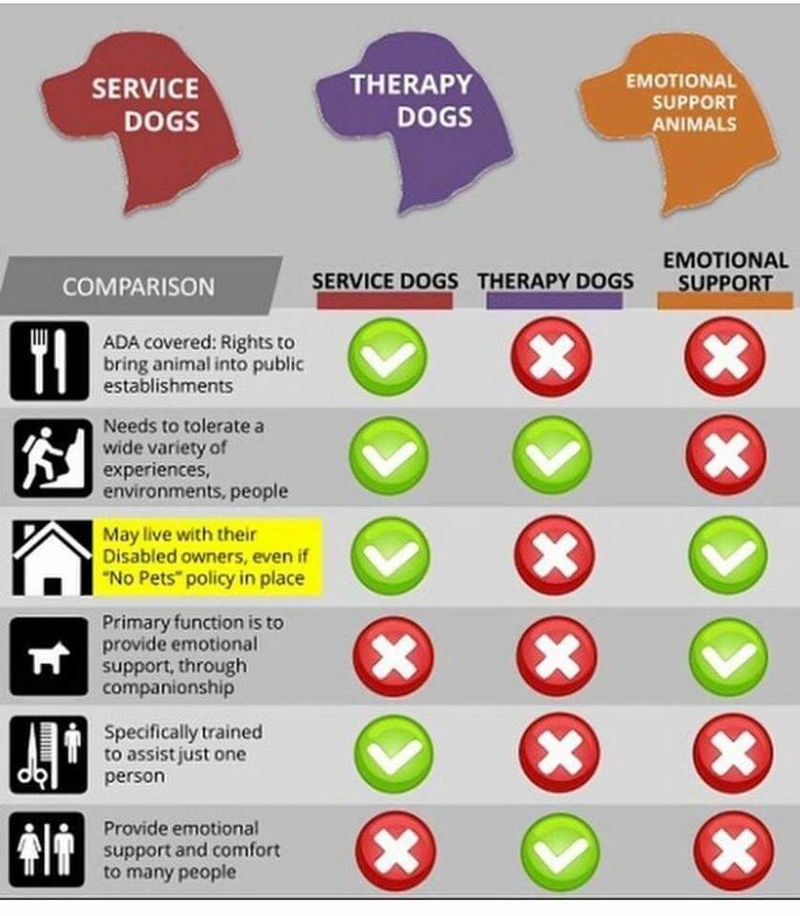Service Animals and The ADA: The Definitive Guide For Property Managers

Property managers around the nation have often been confronted with the emotional issue of animals in rental properties, with managers, landlords, and tenants rarely finding common ground. Often the property manager will be unaware of the animals' presence during a background check or screening. And it's not unusual for animals, typically dogs and cats, to cause damage to a rental property over and above damage caused by their human owners.
Table of Contents
- What is the Difference Between a Pet, a Service Animal, and a Support Animal?
- Service Animals Are Working Animals, Not Pets
- Emotional Support Animal (ESA), Companion, Assistance, and Comfort Animal
- Therapy Animal or Facility Animal
- What Do the ADA and FHA Say?
- What About My State Laws?
- What Are Some Examples Involving Incidences of Pets and Service Animals or Companion Animals That Might Affect Me?
- What Are Your Rights as a Property Manager?
- FAQ's
Got (Service) Animals?
According to the American Humane Society, with 20,000 registered Service Animals in the US, you can be sure this emotional issue will be one of an increasing number of property managers will be confronted with.
Much of the distress and confusion for property managers comes from not understanding the law as it is written, or the rather unclear terminologies surrounding an animal and its handler. Issues relating to a Service Dog, an emotional support or companion animal, persons with a disability, the requirement according to the ADA, FHA, HUD including public accommodation, are all just some of the topics that we'll cover in this article.
But before we review the legal requirement for a property manager, let's define the animals in question.
What is the Difference Between a Pet, a Service Animal, and a Support Animal?
There are numerous terms used by individuals to describe an animal deemed by a handler as one of the following; Service Dog, Service Animal, Companion Animal, Assistance Animal, Emotional Support Animal (ESA), Comfort Animal, Therapy Animal, and Facility Animal. These terms may appear interchangeable in most cases but they are not.
To best understand the distinctions between these terms, it is best for us to look at the Americans With Disabilities Act (ADA) and the Fair Housing Act (FHA) for clarity.
Service Animals are defined only as dogs and miniature horses that are individually trained to do work or perform tasks for people with disabilities.
Examples of work or tasks performed by Service Animals include guiding people who are blind, alerting people who are deaf, pulling a wheelchair, alerting and protecting a person who is having a seizure, reminding a person with mental illness to take prescribed medications, calming a veteran or other person with Post Traumatic Stress Disorder (PTSD) during an anxiety attack, or performing other duties.
Service Animals Are Working Animals, Not Pets

The work or task a service dog or horse has been trained to provide must be directly related to the person’s disability in order to not be considered a pet.
It's worth noting, however, that The ADA does not require service animals to be certified, licensed, or registered as a service animal. Nor are they required to wear service animal vests or patches, or to use a specific type of harness.
While there are individuals and organizations that sell service animal certification or registration documents to the public, The Department of Justice does not recognize these as proof that the dog is a service animal under the ADA.
A service dog or miniature horse may accompany persons with disabilities into places that the public normally goes, even if they have a “No Pets” policy. These areas include state and local government buildings, businesses open to the public, public transportation, and non-profit organizations open to the public.
Types of Service Dogs.
- Guide Dog/Seeing Eye Dog - is a carefully trained Service Dog that serves as a travel tool for persons with severe visual impairment or blindness.
- Hearing or Signal Dog - is a Service Dog that has been carefully trained to alert a person who has significant hearing loss or is deaf.
- Psychiatric Service Animals - is a service dog that has been trained to perform tasks that assist individuals with disabilities to detect the onset of psychiatric episodes and lessen their effects. Tasks performed by psychiatric service animals may include reminding the handler when to take medications, turning on lights or providing safety checks or room searches.
- Social Signal Dog - is a dog trained to assist a person with autism. The dog alerts the handler to distracting repetitive movements common among those with autism.
- Diabetes Alert Dog - is a dog trained to alert a person before their blood sugar becomes too high or low.
- Mobility Assistance Dogs - are dogs trained to assist a person with mobility issues such as standing up, stabilizing when walking, retrieving items, turning on lights, opening doors etc.
- Seizure Response Dogs - are trained to assist a person with a seizure disorder. The dog aids the handler by making sure the handler stays safe during a seizure, or the dog may go for help.
Dogs whose sole function is to provide comfort or emotional support do not qualify as service animals under the ADA .
Miniature Horses.
In addition to the provisions about service dogs, the Dept. of Justice revised ADA regulation has a new, separate provision about Miniature Horses that have been individually trained to do work or perform tasks for people with disabilities.

Emotional Support Animal (ESA), Companion, Assistance, and Comfort Animal.
While these terms are often used interchangeably, these animals and their terms are all essentially the same thing. However, while untrained companion animals, assistance animals, emotional support animals, comfort animals are not classified service animals under Title II and Title III of the ADA.
If an owner has legitimate documentation from a health professional prescribing a disability-related need for the animal, that pet does qualify as an emotional support animal under the broader FHA definition.
As such emotional support animals are offered protection under the law and therefore permitted to live in places where they may otherwise be prohibited. The FHA states Emotional Support Animals can be a dog, cat, or any other species the health professional deems appropriate. These pets do not require any special training.
ESA's that meet these criteria can live with their owners in housing in spite of a No Pets policy and are exempted from pet deposits. They are also allowed on airplanes without a pet fee.
Again, while the ADA specifically does not consider these animals as Service Animals (trained specifically to perform a task) their broader definition as medically prescribed animals does provide these animals with some legal protections under the FHA with regards to housing.
Therapy Animal or Facility Animal.

Therapy animals are animals of any species that visits hospitals, schools, nursing homes and other facilities to interact with patients or students in a mentally or emotionally beneficial way. Dogs, cats, pigs, rats, bunnies and even horses, alpacas and lizards have served as therapy pets. Often dogs and cats go through a rigorous evaluation and are certified by an organization to perform therapy pet duties. These animals are mainly pets who are privately owned by a volunteer, and other than their assigned visits, they have no protections under federal law.
As such, these animals are generally deemed to be pets and subject to all requirements and restrictions a non-pet owning tenant may have to comply with when renting or leasing accommodations.
What Do the ADA and FHA Say?
Current laws exist now at the federal and state level. In order to define what type of animal is legally permitted to reside in a rental property, we must first define who is allowed to own them and what the legal requirement is for both the handler and the property manager.
The Fair Housing Act (FHA) and the Americans With Disabilities Act (ADA): Both are civil rights acts, enacted to provide certain protected classes with equal access to the use of housing and public accommodation.
- The FHA more broadly provides certain classes of people with equal access to housing and to the facilities and services associated to housing. The protected classes include race, color, national origin, religion, gender, familial status, disability. However, many of the provisions of the FHA regarding renting, selling and advertising of housing are not mandated to, and typically do not apply to community associations. However, a community association must be careful that adopted rules & regulations apply equally to all residents, and this cautiously considers requests for reasonable modifications and reasonable accommodation as to avoid any claim of discrimination.
- The ADA specifically addresses the issue of discrimination against individuals with a disability in the use and enjoyment of places of public accommodation. Places of public accommodation are required to maintain certain accessibility features to allow persons with a disability the equal opportunity to access and use the public accommodation.
Get Your Free Trial of Propertyware Today
What About My State Laws?
As of August 2018, there were twenty-three states across the nation that enacted some kind of legislation to crack down on pet-owners who falsely claim their pet as a service animal. While all states comply with the federal laws protecting disabled Americans, the laws and the associated penalties for service animals vary widely between states.
[Additional Reading: 23 States With Fake Service Dog/Animal Laws]
For example, the crime of misrepresenting service dogs/animals in Texas is considered a misdemeanor and punishable by a $300 fine and up to 30 hours of community service.
In California, for instance, it is a misdemeanor to falsely and knowingly claim that you are an owner or trainer of service animals. If found guilty, the perpetrator can face up to six months in jail and/or a fine up to $1000.
Some states even go so far as to make it a crime to impersonate a person with a disability in order to obtain service animals or companion animals. This increased awareness by states is an indication of just how serious the issue of fake service animals has gotten. If the states are passing laws to combat this phenomenon, surely property managers should be made aware of their legal and moral responsibilities too.
What are some example incidences of pets and service animals or companion animals that might affect me?
Animal on Animal Attack. To illustrate an incident that a property manager would have been involved with, check out Earle's story from 2017 where a resident seemingly attempted to smuggle a pet onto the premises "disguised" as a service dog. The pet owner did not herself claim to be disabled, but the story took a turn for the worse when the smuggled pet attacked another residents dog – and that dog was a certified service animal. Needless to say, it did not end well for the tenant who’s aggressive pet was discovered to have been in fact, just that, a pet.
This story highlights the very real legal challenges faced by property managers, landlords, and tenants with a disability when navigating the issue of service animals or emotional support animals. Sadly there are some individuals in our community who will do whatever it takes to game the establishment. The comparison made in this story is a good one, it is not unlike people parking with fake handicap signs in disabled parking spaces. To intentionally deceive a property manager, landlord or other tenants about the status of a pet is not only immoral, but it is also increasingly becoming illegal.
Specific Breeds. Another major consideration for property managers is balancing the well-being of residents and the public on their premises at all times. This can be a challenge regarding certain breeds of dogs that are, fairly or unfairly, often viewed in a negative light. I think a breed that springs to mind, of course, is pit bulls. Love them or not, they are out there in ever-increasing numbers.
I can hear you saying, "Surely pit bulls can't be trained as service animals?". Well, here's the thing...yes. They can. Despite the identification of pit bulls as a particularly dangerous breed, more and more cities are lifting breed-specific bans on pit bulls and others 'dangerous breeds' to once again allow them within city confines. Ultimately, pit bulls and other perceived dangerous breeds that can act as service animals will always fall under the protection of the regulations that count most; The FHA and ADA.
A city may have local laws that include a dangerous breed regulation, but that does not overrule the right any person with a disability has to freely access any public or private area with a service or companion animal. Remember, service animals are not pets. The breed, size, and weight may not be scrutinized when determining whether an animal should be accepted as a service animal.
What Are Your Rights as a Property Manager?
Property managers have to walk the tightrope between providing a welcoming and professional environment for all new or existing residents, while also following due diligence in adhering to the conditions and expectations of a lease, on behalf of the landlord or management company they represent. So, you now know what constitutes a service animal or an emotional support animal (ESA), and what legal protections their handlers are afforded when seeking public accommodations. But what about you? What can you do that displays a clear act of non-discrimination but is also fair to you in the undertaking of your tasks?
What you cannot do is as ask the person what their disability is, even if it is not plainly apparent.
You cannot ask for medical documentation of any kind - for the handler or for the Service Dog.
You also cannot ask the Service Dog demonstrate its ability to perform the work or task.
And finally, you cannot ask for a special identification card or proof of training documentation for Service Dog.
What you can do is determine first if the animal is either: A Service Animal (trained) or an Emotional Support Animal (untrained).
Service Animal: If the animal in question is presented as a Service Dog or Horse, how you determine the status of that Service Dog or Horse is laid out clearly by HUD by asking exactly two questions to determine whether an animal qualifies as a service animal. You may only ask:
- Is this a Service Animal that is required because of a disability?
- What work or tasks has the animal been trained to perform?
That's it. If in doubt? Don't ask!
Emotional Support Animal (ESA): Now, the law is less definitive and does not require that level of compliance when the animal is presented by the owner as an animal providing emotional support.
- A property manager can ask for proof of medical need, such as a note from a doctor or therapist or other official documents supporting the claim.
- A property manager can charge a security deposit and may still seek money from the tenant if there is any damage caused by the animal to the home.
- If the animal presents itself as a nuisance to others, a property manager does have the right to try to remove the support animal through legal proceedings.
- The owner of an ESA must request the accommodation in writing - unlike Service Animals. An example could be a brief personal statement explaining to the property manager or landlord that they are asking for “a reasonable accommodation to keep their pet who functions as an emotional support animal.”
- A property manager cannot request an ESA perform a certain task.
- A property manager cannot inquire about the extent of a person's disability, or ask for detailed medical records.
- A property manager cannot refuse to accommodate an animal based on the limitations of their insurance policy including the species, breed or weight of the support animal.
Again, service animals and emotional support animals are not considered pets so property managers cannot prohibit these animals from living in or freely moving around the rental property. You also cannot charge a pet deposit or pet rent and as such cannot apply a standing Pet Policy to these animals. You may, however, collect a security deposit for a support animal and seek compensation for any damages caused by that specific animal (ex. relieving itself in a carpeted area) such as cleaning or repair costs.
Take A Free Test Drive of Propertyware
Frequently Asked Questions (FAQ's)
Can a cat, bird, snake or other animals be classified as Service Animals?
NO. According to the FHA, service animals are distinctly classified as being a dog or miniature horse only.
Can a cat, bird, snake or other animals be classified as Emotional Support Animals?
YES. According to the FHA, a support animal can be a cat, dog or another type of companion animal, and does not need to be trained to perform a service. The emotional and/or physical benefits from the animal living in the home are what qualify the animal as an assistance animal. A letter from a medical doctor or therapist is all that is needed to classify the animal as an Emotional Support Animal.
How many Service Animals can a resident have?
A resident can have more than one service animal. It may mean a person with a disability requires, for example, two service animals as this person may have a visual disability and a seizure disorder, so uses one service animal to assist with navigating the world and the other as a trained seizure alert dog. There is no maximum number of service animals explicitly stated in current laws.
How many Support Animals can a resident have?
A resident can have more than one Emotional Support Animal. There are no specific rules stating the maximum number of ESAs a person may have. As long as the animal(s) does not violate any state or local laws and the residents' therapist provides supporting documentation for each and every animal, the animals are permitted. As long as this reasonable accommodation clause does not cause any undue burden to the rental unit’s landlord, manager or owner. The number of emotional support animals should also make sense for the accommodation sought. For example, having one or more horses in an apartment may not be feasible, especially given the health and wellbeing of the Support Animals must also be addressed. All animals will need to be fed, groomed and given veterinarian care.
More FAQ's from the ADA.
So Now You Know!
Of course, discrimination is the last thing anyone wants to be accused of in any aspect of life but for property managers, this takes on a whole other significance when looking at the all-encompassing requirements found within the FHA and ADA regulations.
For further information on both FHA and ADA over and above what we covered in this article, I'd strongly suggest you check out the following link and sign up your free copy of ADA and FHA Accessibility Guide For Property Management eBook which is an invaluable resource for property managers. If you're a property manager dealing with the types of issues discussed in this article, my advice to you is to brush up on the state laws or Service Dog Law in your state, as there may be some further pertinent requirements not covered here.
Ultimately I would advise you err on the side of caution, knowing that when a person walks on to your premises and declares the animal with them as anything other than a pet, chances are the law is on their side. Call it a Service Animal, an emotional support dog, an assistance dog, but just don't call it a pet.
Of course, you and the property owner have rights, but as any business owner will tell you - the customer is always right. Don't risk being in breach of the Americans with Disabilities Act in order to collect a pet deposit or deny an application on a hunch. Take the time to meet with the applicant and their animal, ask the right questions and if you still have serious concerns about the validity of a tenant and the status of their animal, seek legal advice from an attorney.
Please note: While every attempt has been made to provide accurate and up-to-date information, this should not replace the qualified advice of a legal professional and is provided for entertainment purposes only.








